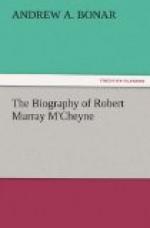In his notes, he has one or two subjects marked for hymns. One of these is—Isaiah 2:3—“Come ye,” etc., a loving call to the Jews. Another is to the same effect—Isaiah 1:15—“Come, let us reason together.” But these he never completed. In Cracow, having heard of the death of a friend, the wife of an English clergyman, in the midst of her days and in the full promise of usefulness, he began to pen a few sweet lines of comfort:
Oft as she taught
the little maids of France
To leave the garland,
castanet, and dance,
And listen to
the words which she would say
About the crowns
that never fade away,
A new expression
kindled in her eye,
A holy brightness,
borrowed from the sky.
And when returning
to her native land,
She bowed beneath
a Father’s chast’ning hand,
When the quick
pulse and flush upon the cheek,
A touching warning
to her friends would speak,
A holy cheerfulness
yet filled her eye,
Willing she was
to live, willing to die.
As the good Shunammite
(the Scriptures tell),
When her son died,
said meekly, “It is well,”
So when Sophia
lost her infant boy,
And felt how dear-bought
is a mother’s joy,
When with green
turf the little grave she spread,
“Not lost,
but gone before,” she meekly said.
And now they sleep
together ’neath the willow
The same dew drops
upon their silent pillow.
Return, O mourner,
from this double grave,
And praise the
God who all her graces gave.
Follow her faith,
and let her mantle be
A cloak of holy
zeal to cover thee.
The danger which he incurred from the shepherds in this region, and other similar perils to which he was exposed in company with others, have been recorded in the Narrative. Out of them all the Lord delivered him; and not from these perils only did He save him, but from many severe trials to his health, to which variety of climate and discomforts of accommodation subjected him. And now we were traversing Prussia, drawing nearer our own land. It was about five months since we had received letters from Scotland, our route having led us away from places which we had anticipated visiting, and where communications had been left for us. We pressed homeward somewhat anxiously, yet wondering often at past mercies. In a letter from Berlin, Mr. M’Cheyne remarked, “Our heavenly Father has brought us through so many trials and dangers that I feel persuaded He will yet carry us to the end. Like John, we shall fulfil our course. ’Are there not twelve hours in the day?’ Are we not all immortal till our work is done?” His strength was rapidly increasing; the journey had answered the ends anticipated to a great extent, in his restoration to health. He was able to preach at Hamburgh to the English congregation of Mr. Rheder, from whom it was that the first hint of a Revival in Dundee reached his ears. He heard just so much both of Kilsyth and Dundee as to make him long to hear more. A few days after, on board the vessel that conveyed us to England, he thus expressed his feelings:—




